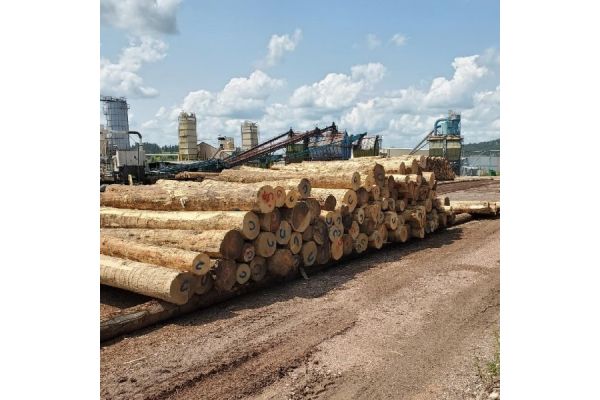Logs for the Timber Transport Pilot Arrive in Wyoming

EDGEFIELD, S.C. — Earlier this year, the National Wild Turkey Federation initiated a pilot program as a part of the 20-year national master stewardship agreement with the USDA Forest Service. This program, referred to as the Timber Transport Pilot, aimed to tackle the ongoing wildfire crisis while also contributing to the conservation of wild turkey habitat in the west. Its success paves the path for forthcoming projects throughout the western region.
The Timber Transport Pilot began with the harvest of standing timber in the Klamath National Forest of northern California. Harvested logs were then hauled by truck to Gilchrist Forest Products in Gilchrest, Oregon, where they were evaluated for size and the presence of a fungal infestation known as “blue stain”. Logs that met the required criteria were then debarked for insects and disease control. Subsequently, logs were hauled to the Burlington Northern railway siding in Klamath Falls, Oregon and loaded on retrofitted and bunked rail cars to start the 1,490-mile journey to Upton, Wyoming.
After the 30-day train ride, the logs reached their destination in Wyoming June 13. The next day, the logs were unloaded onto trucks for transport to the Neiman Sawmill in Hulett, Wyoming. At this mill, logs will be processed and transformed into “bright pine” boards, which are then sold to Andersen Windows.
The Timber Transport Pilot has fostered collaboration among various partners, including the Forest Service, California Deer Association and Neiman Enterprises, Inc. By working together, these organizations have underscored the importance of partnerships and shared stewardship to mitigate the significant threat posed by wildfires and promote long-term forest restoration.
The NWTF’s involvement in the Timber Transport Pilot aligns with its commitment to conserving wild turkey habitat and tackling the wildfire crisis. By partnering with the Forest Service and implementing the Wildfire Crisis Strategy, the NWTF seeks to extend its conservation efforts beyond traditional forest stewardship and address the broader challenge of mitigating wildfire fuels across the 90 million acres of Forest Service lands in need of forest restoration.
“This is NWTF’s opportunity to be part of the solution to what is an American problem, not just a USFS problem,” said Tom Spezze, NWTF national director of field conservation/state policy. “This crisis has been a spectator sport for too long and the NWTF is leading all conservation NGOs nationally in this effort.”
Improving wild turkey habitat through the implementation of this pilot program has also been a key focus for the NWTF and its partners. The excessive abundance of timber in California has led to significant degradation of wild turkey habitats, with an alarming increase in the number of trees per acre. The optimal range of 50-75 trees per acre for favorable wildlife habitat has been exceeded, reaching as high as 500-1,000 trees per acre. This dense tree cover not only exacerbates fuel accumulation but also intensifies the risk of catastrophic wildfires, posing a severe threat to wildlife habitats.
Additionally, in the Black Hills National Forest, the pressing need to sustain mill operations for the sake of the local economy has resulted in the overharvesting of ponderosa pine. This practice jeopardizes the delicate balance required for maintaining suitable wild turkey habitats.
Overall, the project has begun to alleviate the overabundance of trees in California, mitigate the risk of catastrophic wildfires, enhance wildlife habitat and support the economic needs of the Wyoming mill. Through the removal of timber from California’s overstocked forests and its transportation to the mill in Wyoming, the Timber Transport Pilot has created a mutually beneficial situation for all parties involved.
Currently, the NWTF is working on implementing supplemental project agreements in the Rocky Mountain region and the Pacific Northwest region. These agreements are intended to expand the scope of the Timber Transport Pilot by incorporating additional timber sales and pivoting the NWTF into other Wildfire Crisis Strategy efforts.
About the National Wild Turkey Federation
Since 1973, the National Wild Turkey Federation has invested over half a billion dollars into wildlife conservation and has conserved or enhanced over 22 million acres of critical wildlife habitat. The organization continues to drive wildlife conservation, forest resiliency and robust recreational opportunities throughout the U.S. by working across boundaries on a landscape scale.
2023 is the NWTF’s 50th Anniversary and an opportunity to propel the organization’s mission into the future while honoring its rich history. For its 50-year celebration, the NWTF has set six ambitious goals: positively impact 1 million acres of wildlife habitat; raise $500,000 for wild turkey research; increase membership to 250,000 members; dedicate $1 million to education and outreach programs; raise $5 million to invest in technology and the NWTF’s people; and raise $5 million to build toward a $50 million endowment for the future. Learn how you can help us reach these lofty goals.
The post Logs for the Timber Transport Pilot Arrive in Wyoming appeared first on HuntingLife.com.
